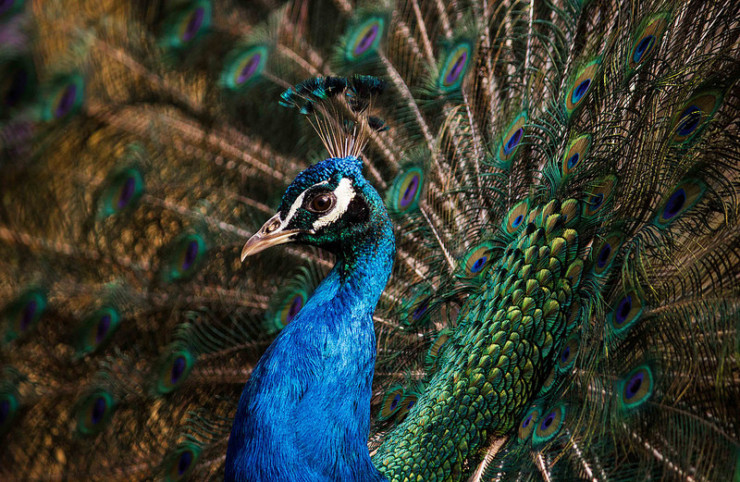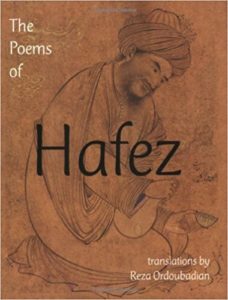
Shamseddin Hafez was writing poetry in what is now south-central Iran at the same time Geoffrey Chaucer was writing poetry in England. His influence continues today in Iran, where he’s still the country’s most popular poet.

The tomb of Hafez in Shiraz
Hafez was born between 1310 and 1325 in the city of Shiraz. His real name was Shamseddin Mohammed, but he used “Hafez” as his pen name and it is by Hafez he is known today. We know certain basic facts about him. He was married and had one child. He was often involved in political intrigue and upheavals at court; his fortunes ebbed and flowed with changes in rulers. He taught Koranic studies, and he’s said to have memorized the Koran as a boy listening to his father’s daily recitations. He died in 1388 and was buried in Shiraz; his tomb is still a major site for tourism and pilgrimage.
He wrote poetry in primarily one form—the ghazal, rhyming couplets with a refrain. Translating a Persian ghazal into an English ghazal presents numerous literary challenges, writes Reza Ordoubadian, the translator of the 2006 edition I read, The Poems of Hafez. Persian, he says, “combines words together in a synthesis and agglutination to make a sentence,” while English is a very analytical language. He compares the challenge to music, with Persian music having more modes than Western music.
For translating the poems of Hafez, this meant that Ordoubadian set aside the task of trying to make lines rhyme and instead focused on translating the meaning. Here is Ghazal No. 29 from the collection:

your delicious smile: no rose bud hopes to gain!
O scented rose, will you set on fire our nightingale?
Who sings your praise all night—the lover’s prayer!
Weary of the company of angels, yet
I bear the chaos of the world for your sake.
What a treasure of love! Poor and proud,
your beggar nicks the crown of kings!
The garment of virtue and the cup of wine are incompatible:
all my plans lead to satisfy you!
The passion of the wine of your love stops my breath short:
may this fevered head become the dust of your road.
The crown of my fancy is the seat of your vision.
A prayer: may there never be a place without you in that place!
Your face, a garden, especially in the spring of beauty:
Hafez pens sweet words, serving as your bird of songs!

Reza Ordoubadian
This poem shares several characteristics in common with the other 200-plus poems in the collection. It is a love poem, and the object is like the poet’s muse, a real person who was not Hafez’s wife and who never returned the poet’s love. Second, it is a rather sensual poem, using the imagery of flowers and birds to communicate love. Third, it mentions wine, another image connected to the poet’s love; wine figures in many of his poems. And the final two-line refrain contains a direct reference to the poet and his writing—a trademark he uses in virtually all his poems.
Ordoubadian (1932-2017), the translator, was born in Persia and received a B.A. degree from the University of Tehran in 1954. He did postgraduate work as a Fulbright scholar at Duke University, and received an M.A. degree (1965) and a Ph.D. degree (1967) from Auburn University. He worked as a professor of linguistics at Middle Tennessee University in Murfreesboro beginning in 1962, and was a professor emeritus at the time of his death in April. In his introduction to this collection, he tells the story of returning to Iran, and in the ride from the airport to central Tehran he hears his taxi driver singing a ghazal of Hafez, a tribute to the poet’s enduring influence.
Sensual, filled with imagery of love and passion, The Poems of Hafez provides a fine introduction to an important poet in his own country and in world literature.
Related:
Seth Haines tries his hand at penning a ghazal
An invitation to write a ghazal of a childhood loss
Photo by Corina Naf, Creative Commons, via Flickr. Post by Glynn Young, author of the novels Dancing Priest and A Light Shining, and Poetry at Work.
__________________________

“I require all our incoming poetry students—in the MFA I direct—to buy and read this book.”
—Jeanetta Calhoun Mish
- Longfellow’s “Paul Revere’s Ride”: Creating a National Legend - April 17, 2025
- Poets and Poems: Katie Kalisz and “Flu Season” - April 15, 2025
- Poets and Poems: Michelle Ortega and “When You Ask Me, Why Paris?” - April 10, 2025
Mary Harwell Sayler says
Thanks, Glynn, for your interesting post. It reminded me of the section on writing a ghazal in my e-book – the Christian Poet’s Guide to Writing Poetry. So I just posted my understanding of the ghazal form as Hafez might have written https://thepoetryeditor.blogspot.com/2017/07/writing-ghazal.html.
Glynn says
Mary – thanks for the link!
Donna Falcone says
It’s amazing to me that Reza Ordoubadian was able to translate and, I trust, keep the meaning as intended. What a brave undertaking!
I love this line the most:
A prayer: may there never be a place without you in that place!